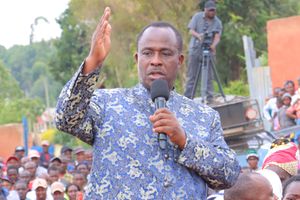
President William Ruto
In August last year, the Presidential Working Party on Education Reforms handed over a report to President William Ruto with far-reaching recommendations on restructuring the education sector.
One of the objectives of the Working Party was to review and make recommendations on governance framework for university education, research and training to ensure effectiveness and efficiency in the sector.
Based on evidence presented before it, the Working Party reported that one of the major challenges facing university education was poor planning.
Consequently, the team recommended a freeze on unplanned expansion of universities as well as merger and amalgamation of some of the existing institutions.
Furthermore, the Working Party chaired by veteran university administrator, Prof Raphael Munavu, proposed deletion of a section of the Universities Act 2012 that provides for the establishment of a university in every county. The objective of all these was to create order in university education.
In turn, President Ruto made a commitment that henceforth, development of universities would be based on proper planning. He put a freeze on establishment of new public universities and declared that creation of any new institution would be done subject to the advice of the Commission for University Education.
At the time, the country had 78 public and private universities with constituent colleges, comprising 35 chartered public universities, one specialised university, six constituent colleges and 27 chartered private universities, 2 constituent colleges and seven operating with letters of interim authority. To date, there are 79 universities following the establishment of the Open University of Kenya.
In May, during a meeting with vice-chancellors of public universities at State House, President Ruto directed the institutions to scrap non-attractive courses, arguing they were a drain on national resources.
Also Read: The evolution of Kenya’s education system
Given this context, players in the education sector must have been taken aback when President Ruto announced the establishment of Nyamira University during his three-day tour of the Gusii region this past week. The announcement and the jostling surrounding it was clearly political.
In what was typical of roadside or top-of-car-roof pronouncement, President Ruto declared that the proposed new university would serve the local people, a perfect demonstration of the perverted perspective political leaders have about university education.
And this has been Kenya’s tragedy. Universities are national and international establishments, not village institutions created to serve parochial ethnic interests.
Establishment of universities is not a political issue; it is a professional and administrative business. The Universities Act outlines the process and criteria for the establishment of a new university.
Precisely, the law states that for a new university to be set up, there must be a formal proposal outlining the aims, objectives and the need for its establishment, which must align with the country’s socio-economic development plan.
Also Read: Inside the Open University of Kenya
Additionally, the proposal must outline the academic programmes to be offered, teaching and learning resources, faculty and finances, among others.
To be sure, the Universities Act contains elaborately lays out the plan for the establishment of universities, and for a good reason. The framers of the law sought to cure the malady of unplanned university education that has wreaked havoc in the sector for the past two decades.
Unplanned expansion of universities has created a terrible mess in the sector.
As President Ruto made the announcement and played out to the public gallery, the reality on the ground is that the universities are facing serious existential threats.
Top on the list is the cash crunch that has pushed the institutions to the cliff. The universities are breaking down under the yoke of huge debt burden that stands at Sh75 billion.
Due to the cash crunch, the universities are unable to pay salaries and which has pushed the teaching and non-teaching staff unions to issue a strike notice beginning September when the new academic year commences. In itself, this signals a new crisis because the strike will disrupt academic programmes and affect university operations.
Indeed, the gravity of the cash crisis is highlighted in the latest Auditor-General Report, for the 2021/2022 financial year, which shows that out of 39 universities then, 31 were in financial distress. Notably, 18 universities were in the red, operating with a cumulative cash deficit of Sh42 billion, which technically means they are insolvent.
The second challenge with the haphazard establishment of universities is the duplication of courses, which contributes to graduate unemployment. Ideally, as articulated in the Universities Act, any new university should serve the felt and real needs of the country.
However, an analysis of programmes offered by all the news universities shows that they are just duplicate of existing courses.
Take for example, the universities established in the past six years such as Tom Mboya, Koitalel Arap Samoei, Mama Ngina, Kaimosi, Tharaka and Bomet, they all offer the following programmes, education, arts and social sciences, business and economics, entrepreneurship and general sciences.
None of these programmes is unique, they are available in the existing universities. Put simply, there is nothing distinctive about the new universities other than duplicating programmes offered in the existing universities. Worse, they do not have the requisite teaching and learning resources to mount those courses and create value for the learners.
The third challenge is staff shortage and lack of teaching and learning resources. In many universities, students are crammed in lecture theatres and have to make do with poorly equipped laboratories and workshops. Staff shortage is a perennial problem, with many universities operating without qualified lecturers and depend on part-timers to run their programmes.
In sum, President Ruto is dragging us back. We do not need Nyamira university or any other. Rather than chart a new direction and pull the universities out of the rut, President Ruto is fomenting new problems.
We should keep politics off university education and let experts plan and advise the government on the appropriate development strategies for the sector.
David Aduda is Consulting Editor and Education Specialist; [email protected]











